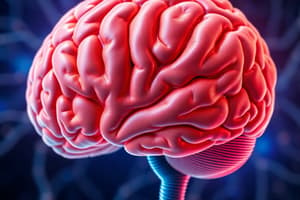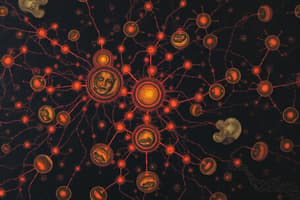Podcast
Questions and Answers
What are extrapyramidal symptoms (EPSs)?
What are extrapyramidal symptoms (EPSs)?
Serious neurologic symptoms that are major side effects of antipsychotic drugs.
What is akathisia?
What is akathisia?
An intense need to move about.
Which of the following are anticholinergic side effects?
Which of the following are anticholinergic side effects?
- Blurred near vision (correct)
- Orthostatic hypotension (correct)
- Dry mouth (correct)
- Severe headache
What is the definition of half-life?
What is the definition of half-life?
What does the kindling process refer to?
What does the kindling process refer to?
What is the limbic system?
What is the limbic system?
What are antipsychotic drugs used for?
What are antipsychotic drugs used for?
What are anxiolytic drugs used to treat?
What are anxiolytic drugs used to treat?
What does a black box warning indicate?
What does a black box warning indicate?
What is computed tomography (CT)?
What is computed tomography (CT)?
What is a depot injection?
What is a depot injection?
What role does dopamine play in the nervous system?
What role does dopamine play in the nervous system?
What is norepinephrine also known as?
What is norepinephrine also known as?
What is dystonia?
What is dystonia?
What is off-label use of a drug?
What is off-label use of a drug?
Flashcards are hidden until you start studying
Study Notes
Neurobiologic Theories and Extrapyramidal Symptoms (EPSs)
- Extrapyramidal symptoms (EPSs) are serious neurologic side effects associated with antipsychotic medications.
- Common EPSs include acute dystonia, pseudoparkinsonism, and akathisia.
Akathisia
- Characterized by an intense, uncontrollable need to move.
Anticholinergic Side Effects
- Can occur during antipsychotic treatment, causing symptoms such as:
- Orthostatic hypotension
- Dry mouth
- Constipation
- Urinary hesitance or retention
- Blurred near vision
- Dry eyes and photophobia
- Nasal congestion
- Decreased memory function
Antidepressant Drugs
- Primarily prescribed for:
- Major depressive disorders
- Anxiety disorders
- Depressed phases in bipolar disorder
- Psychotic depression
Antipsychotic Drugs
- Previously known as neuroleptics, used to address symptoms of psychosis, including:
- Delusions and hallucinations in schizophrenia
- Schizoaffective disorder
- Manic phases of bipolar disorder
Anxiolytic Drugs
- Indicated for treating:
- Anxiety and anxiety disorders
- Insomnia
- Obsessive-compulsive disorder (OCD)
- Depression
- Posttraumatic stress disorder (PTSD)
- Alcohol withdrawal symptoms
Black Box Warning
- A mandated warning on drug packaging that highlights the risk of serious or life-threatening side effects.
Computed Tomography (CT)
- Also known as computed axial tomography, this imaging technique employs a precise x-ray beam to capture cross-sectional images layer by layer.
Depot Injection
- A method for delivering intramuscular medication in a time-release format for maintenance therapy.
Dopamine
- A crucial neurotransmitter mainly found in the brain stem, implicated in:
- Controlling complex movements
- Motivational drives
- Cognitive function
- Emotional response regulation
Norepinephrine (Noradrenaline)
- Predominant neurotransmitter in the nervous system, focused in the brain stem, involved in:
- Attention and learning
- Memory
- Sleep-wake cycles
- Mood regulation
Dystonia
- Neuromuscular condition presenting with:
- Muscular rigidity and cramping
- Stiff or thick tongue, leading to swallowing difficulties
- Severe cases may cause laryngospasm and respiratory complications
Half-Life
- The duration required for half of a drug to be eliminated from the bloodstream.
Kindling Process
- Describes the escalating frequency and severity of seizures, where minor seizure activities compound over time.
Limbic System
- Brain region situated above the brain stem comprising the thalamus, hypothalamus, hippocampus, and amygdala, crucial in emotion and memory processing.
Magnetic Resonance Imaging (MRI)
- Imaging technique creating a visual scan through a magnetic field and radio waves.
Mood-Stabilizing Drugs
- Used to manage bipolar disorder, focusing on stabilizing mood swings and treating acute manic episodes.
Neuroleptic Malignant Syndrome
- A potential fatal reaction to antipsychotic drugs, presenting with:
- Rigidity
- High fever
- Autonomic instability and diaphoresis
- Delirium
- Elevated creatine phosphokinase levels
Studying That Suits You
Use AI to generate personalized quizzes and flashcards to suit your learning preferences.




